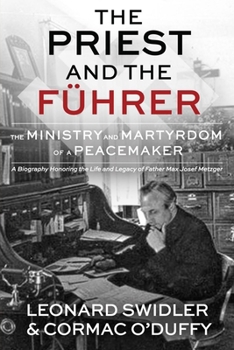The Priest and the Führer: The Ministry and Martyrdom of a Peacemaker
One priest's defiance sparked a legacy of hope. Discover the legacy of Max Josef Metzger.
A must-read for history buffs, theology enthusiasts, or anyone captivated by extraordinary lives, this is the story of Max Josef Metzger, a Catholic priest whose unwavering courage and vision in the face of the Third Reich made a significant mark on history. Metzger, a staunch pacifist who met his end at the hands of the Nazis, championed peace, dialogue, and unity in an era of turmoil. His key contributions to the Una Sancta Brotherhood shifted Germany's political dynamics and fueled the Second Vatican Council's mission of Christian Unity.
But Metzger was not just a theologian. He was a forward thinker, advocating for vegetarianism in an era when its environmental and moral benefits were barely understood. His establishment of vegetarian restaurants and promotion of Esperanto, a universal language, underscored his dream of global harmony.
Yet, it's the personal tales of valor, like secretly leading Jews away from the Gestapo's grasp, that truly define his commitment to justice and humanity. Metzger's story is one of immense challenges, but through them, he emerges as a genuine hero. His life was a testament to his dedication to world peace and Christian unity, often at the cost of personal sacrifice.
The Priest and the F hrer offers readers an intimate look at a man whose bravery, innovation, and indomitable spirit were unmatched. Delve into the tale of a leader whose legacy truly deserves the world's attention.
Authors Leonard Swidler and Cormac O'Duffy studied Fr. Metzger's life and work independently for decades before collaborating on this book. Professor Swidler became interested in Metzger through his research on the Una Sancta Movement, which culminated in a book titled The Ecumenical Vanguard (1966). O'Duffy discovered Metzger through his interest in ecumenism and was further inspired to pursue more about him after reading Swidler's book. As a composer, O'Duffy highlights Metzger's artistic works and breathes new life into his poetry and texts by setting them to music-including the "prison poems" Metzger wrote in the weeks before his





